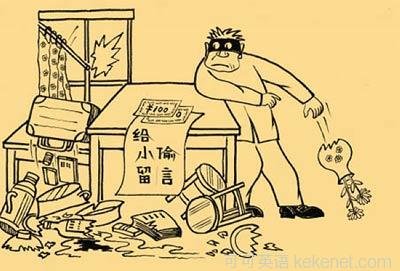南昌某大學(xué)的大一新生王金晶(音譯)本以為自己已經(jīng)為校園生活做足了準(zhǔn)備,包括洗衣服以及怎樣健康飲食。萬事俱備,卻唯獨(dú)忽略了一點(diǎn):盜竊。
One day the 18-year-old was shocked to discover that his laptop, a mobile phone and some cash had been stolen overnight.
“The school said it was a fellow student who had stolen my things and that they had already admitted their mistake,” said Wang.
A recent report entitled Green Book of Campus Crimes issued by a local procuratorate in Wuhan indicates that campus crime, especially theft, has been on the rise. Experts say that misconceptions of wealth might be to blame for the trend.
近日,武漢當(dāng)?shù)氐臋z察機(jī)關(guān)發(fā)布了一份名為“校園犯罪綠皮書”的報(bào)告。報(bào)告中指出:校園犯罪事件,尤其是盜竊,呈不斷上升趨勢(shì)。專家指出錯(cuò)誤的財(cái)富觀可能是導(dǎo)致這一現(xiàn)象的罪魁禍?zhǔn)住?/div>
There are over 38 universities and colleges under the jurisdiction of Hongshan Procuratorate of Wuhan, including top institutions such as Wuhan University, Central China Normal University and Huazhong University of Science and Technology, covering approximately 800,000 students. During the past five years, 238 crimes involving 264 students have been filed, according to the Green Book.
洪山區(qū)檢察院的管轄范圍內(nèi)共有超過38所大學(xué),其中包括武漢大學(xué)、華中師范大學(xué)和華中科技大學(xué)這樣的名牌大學(xué)。轄區(qū)內(nèi)有近80萬名學(xué)生。“綠皮書”中指出:在過去五年里,記錄在案的犯罪事件共238起,涉案學(xué)生多達(dá)264人。
“Over 75 percent of campus crimes are theft and the number of cases are on the rise,” said Li Chen, an official from Hongshan Procuratorate who asked to remain anonymous due to the nature of his job. “It is a very worrisome sign, both for campus safety and student ethics.”
洪山區(qū)檢察院的工作人員李晨(由于工作性質(zhì),這里采用化名)表示:“75%以上的校園犯罪事件都是偷竊,這一數(shù)字還在不斷增加。無論是對(duì)于校園安全還是對(duì)于學(xué)生道德品行而言,該現(xiàn)象都令人堪憂。”
Local police investigated a case of organized theft on a Wuhan-based campus in June last year and found a student stealing laptops from classmates before passing them to others to sell, splitting the proceeds.
去年6月,當(dāng)?shù)鼐皆谖錆h某高校破獲了一起有組織的盜竊案件,作案人將從同學(xué)那里偷來的筆記本電腦交與同伙銷贓分贓。
According to Xiao Jianqun, a local police officer in Wuhan, the majority of students facing charges of theft regretted their actions and cited a sense of vanity and envy as the reason for their behavior.
據(jù)當(dāng)?shù)鼐傩そㄈㄒ糇g)稱,大多數(shù)因盜竊而獲罪的學(xué)生都對(duì)自己的行為追悔莫及。他們說虛榮心和嫉妒心是他們犯罪的主要?jiǎng)訖C(jī)。
Liang Yan, from the student affairs office at the Southwestern University of Science and Technology, views the phenomenon as an extension of wider social issues.
來自西南科技大學(xué)學(xué)生事務(wù)處的梁燕(音譯)認(rèn)為該現(xiàn)象是更為廣泛的社會(huì)問題在校園的延伸。
“Campuses, like society, are witnessing an increasing gap of wealth among students,” said Liang. “You can see some students driving posh cars, while their roommates have a budget of only 300-yuan for the month.”
梁燕說:“大學(xué)校園就像一個(gè)社會(huì)一樣,學(xué)生間的貧富差距正在逐步拉大。你可以看到一些學(xué)生開著豪車,而他們的室友每月只有300元的生活費(fèi)。”
Officer Xiao suggests students be more cautious. “Nowadays, students have all kinds of gadgets and they are easy targets if they let their guard down thinking that nothing can happen on campus.”
肖建全警官提醒學(xué)生應(yīng)多加防范:“如今,學(xué)生們的裝備可謂五花八門。而一旦他們認(rèn)為校園里風(fēng)平浪靜從而放松警惕的話,那么他們就很容易成為小偷下手的目標(biāo)。”
According to Hongshan Procuratorate, 17 universities and colleges in Wuhan are setting up associations for campus crime prevention in order to tackle the problem.
據(jù)洪山區(qū)檢察院稱,在武漢,17所高校聯(lián)合成立了預(yù)防校園犯罪協(xié)會(huì),旨在杜絕此類問題。
“Any campus crime, theft included, can have a great impact on students’ mindsets,” said Li Chen. “Minimizing campus crime is beneficial for students and the future of the country.”
李晨說:“包括盜竊在內(nèi)的任何一種校園犯罪都會(huì)對(duì)學(xué)生的心態(tài)產(chǎn)生嚴(yán)重影響。最大程度降低校園犯罪率對(duì)于學(xué)生和國家未來而言都十分有益。”
Freshman Wang feels the atmosphere in the dormitories has changed since the thefts happened. Although no one talks about it, there is a tension among the students and everyone is locking up their valuables.
自打盜竊事件發(fā)生后,新生王金晶就感覺寢室氛圍發(fā)生了變化。盡管大家都絕口不提,但是同學(xué)間關(guān)系變得十分緊張。大家都把貴重物品鎖了起來。
“I don’t like the feeling of distrust among fellow students,” said Wang.
王金晶說:“我并不喜歡同學(xué)之間的這種不信任感。”


